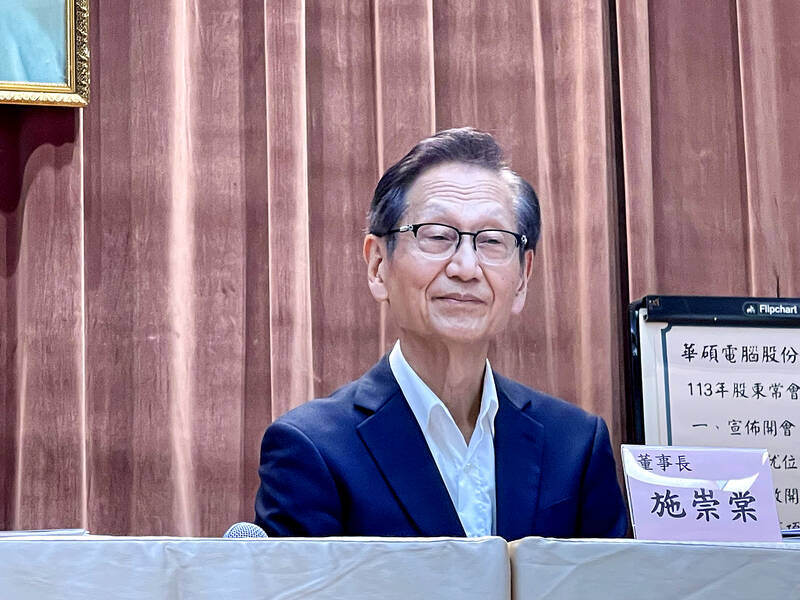PC vendor Asustek Computer Inc (華碩) yesterday said it is making better advances in expanding its server revenue over a five-year span to 2026, extending last quarter’s growth momentum.
Asustek fell behind its local peers in tapping into the server market, but its ambition to grow server revenue by five times within the 2022 to 2026 period looks more realistic after its strong performance in this year’s first quarter.
Server revenue increased several times last quarter from a year earlier to about NT$100 billion (US$3.1 billion), Asustek said.

Photo: Vanessa Cho, Taipei Times
“We are a latecomer to the server market, but we are making all-out efforts to achieve a better performance than we have announced,” Asustek chairman Jonney Shih (施崇棠) told reporters after the company’s annual shareholders’ meeting yesterday.
“There will be multiple times [of growth]. Besides, the timing is just ripe,” Shih said.
Asustek said it is confident that its server business would grow at a similar pace throughout this year, driven by robust demand for artificial intelligence (AI) servers.
The company counts some of the world’s major cloud server providers as its server clients.
Asustek said about 70 percent to 80 percent of its server revenue came from AI servers.
To play catch-up, Asustek has created a server team, which comprises more than 600 engineers.
The company said it aims to expand the team without giving any specific numbers.
Asustek said its server team is can compete with the nation’s major original design manufacturing (ODM) companies in developing high-quality products.
The company said it can equip servers with Nvidia Corp’s latest Blackwell GPU architecture.
Quanta Computer Inc (廣達), which makes AI servers powered by Nvidia’s AI chips, has the biggest server team among local ODM companies, with 2,200. Quanta aims to grow its server team by 10 percent this year to catch up with strong demand.
Asustek is also focusing on developing its AI robot ZenBo.
The company invested in AI robots a few years ago, but its development was “premature,” given inadequate computing power at the time, Shih said.
“There was no fundamental demand at the time, as it was not intelligent enough to interact with users,” Shih said. “Now, Asustek’s Zenbo can speak to users fluently and respond to their needs after being trained on big-language models”
“The timing is right,” he added.

TAKING STOCK: A Taiwanese cookware firm in Vietnam urged customers to assess inventory or place orders early so shipments can reach the US while tariffs are paused Taiwanese businesses in Vietnam are exploring alternatives after the White House imposed a 46 percent import duty on Vietnamese goods, following US President Donald Trump’s announcement of “reciprocal” tariffs on the US’ trading partners. Lo Shih-liang (羅世良), chairman of Brico Industry Co (裕茂工業), a Taiwanese company that manufactures cast iron cookware and stove components in Vietnam, said that more than 40 percent of his business was tied to the US market, describing the constant US policy shifts as an emotional roller coaster. “I work during the day and stay up all night watching the news. I’ve been following US news until 3am

UNCERTAINTY: Innolux activated a stringent supply chain management mechanism, as it did during the COVID-19 pandemic, to ensure optimal inventory levels for customers Flat-panel display makers AUO Corp (友達) and Innolux Corp (群創) yesterday said that about 12 to 20 percent of their display business is at risk of potential US tariffs and that they would relocate production or shipment destinations to mitigate the levies’ effects. US tariffs would have a direct impact of US$200 million on AUO’s revenue, company chairman Paul Peng (彭雙浪) told reporters on the sidelines of the Touch Taiwan trade show in Taipei yesterday. That would make up about 12 percent of the company’s overall revenue. To cope with the tariff uncertainty, AUO plans to allocate its production to manufacturing facilities in

COLLABORATION: Given Taiwan’s key position in global supply chains, the US firm is discussing strategies with local partners and clients to deal with global uncertainties Advanced Micro Devices Inc (AMD) yesterday said it is meeting with local ecosystem partners, including Taiwan Semiconductor Manufacturing Co (TSMC, 台積電), to discuss strategies, including long-term manufacturing, to navigate uncertainties such as US tariffs, as Taiwan occupies an important position in global supply chains. AMD chief executive officer Lisa Su (蘇姿丰) told reporters that Taiwan is an important part of the chip designer’s ecosystem and she is discussing with partners and customers in Taiwan to forge strong collaborations on different areas during this critical period. AMD has just become the first artificial-intelligence (AI) server chip customer of TSMC to utilize its advanced

Six years ago, LVMH’s billionaire CEO Bernard Arnault and US President Donald Trump cut the blue ribbon on a factory in rural Texas that would make designer handbags for Louis Vuitton, one of the world’s best-known luxury brands. However, since the high-profile opening, the factory has faced a host of problems limiting production, 11 former Louis Vuitton employees said. The site has consistently ranked among the worst-performing for Louis Vuitton globally, “significantly” underperforming other facilities, said three former Louis Vuitton workers and a senior industry source, who cited internal rankings shared with staff. The plant’s problems — which have not